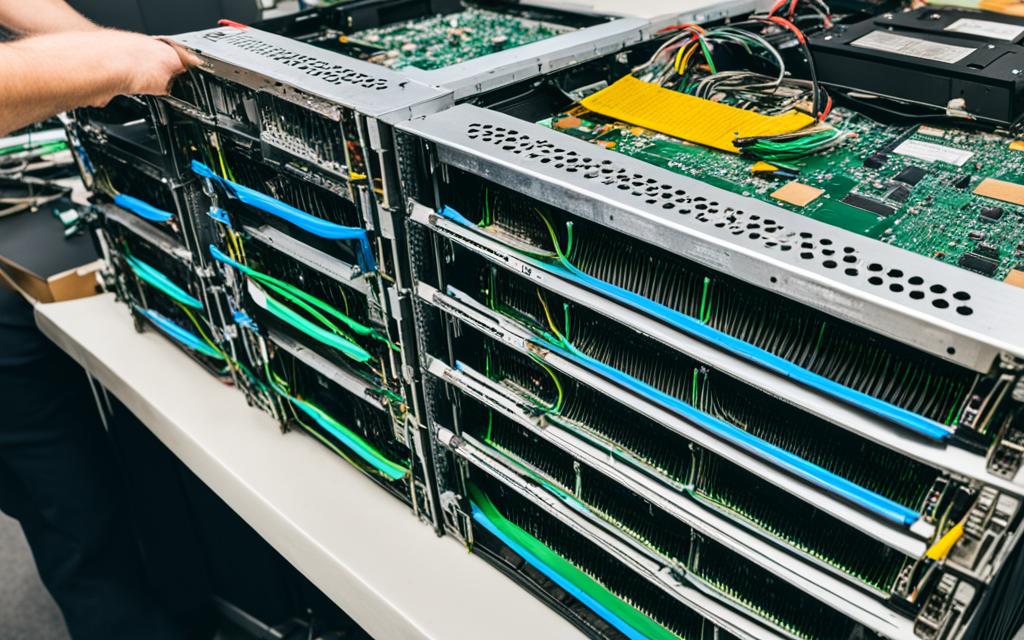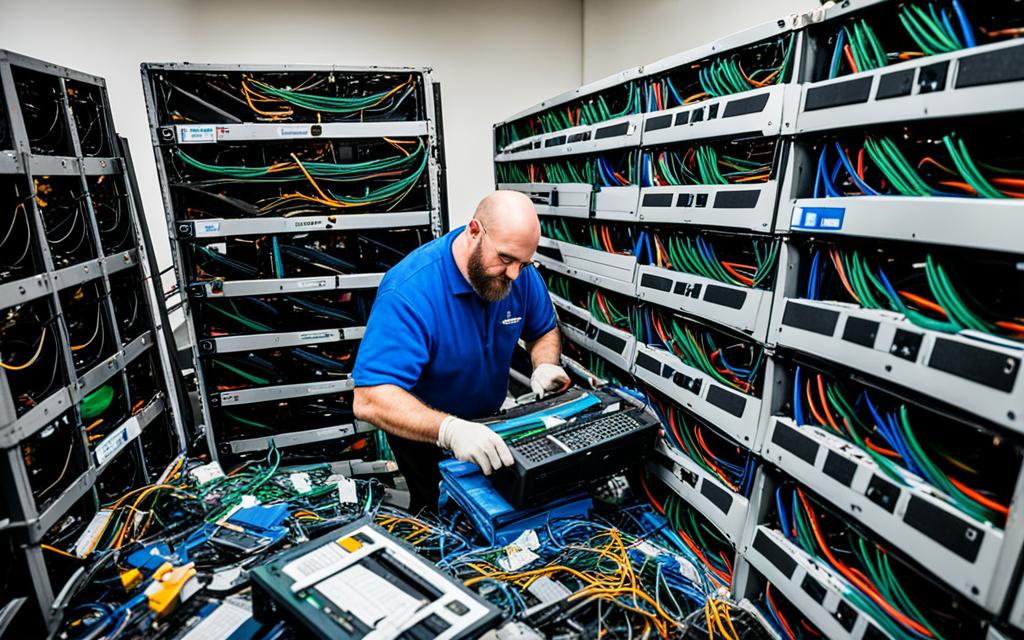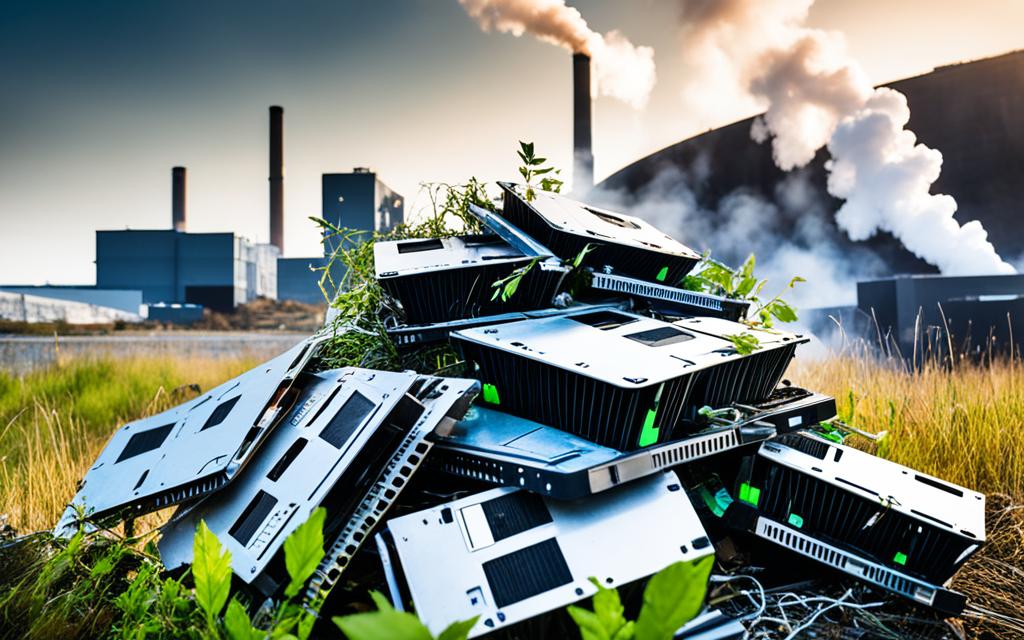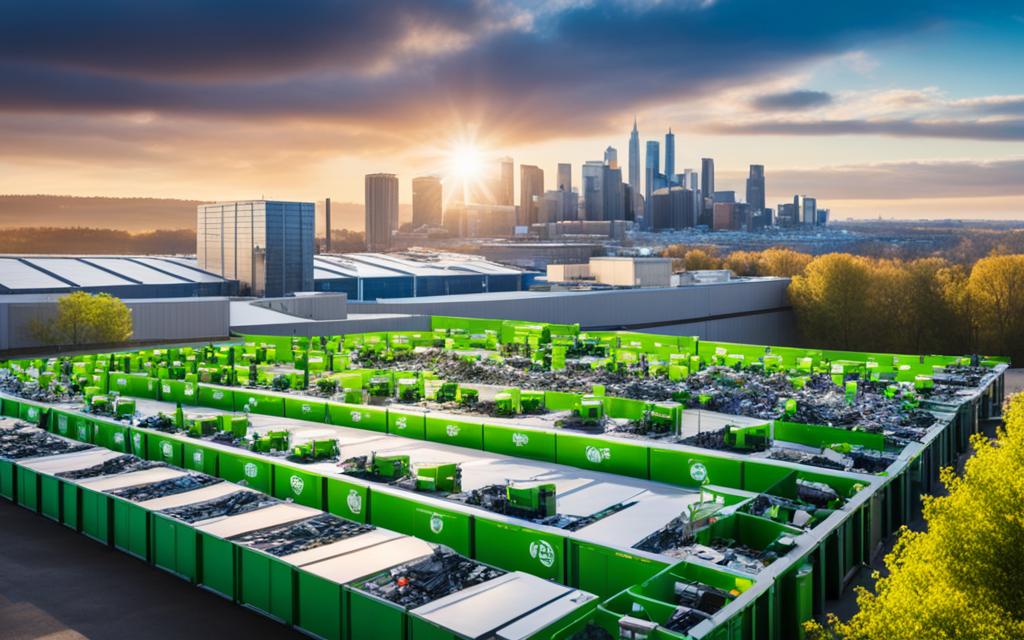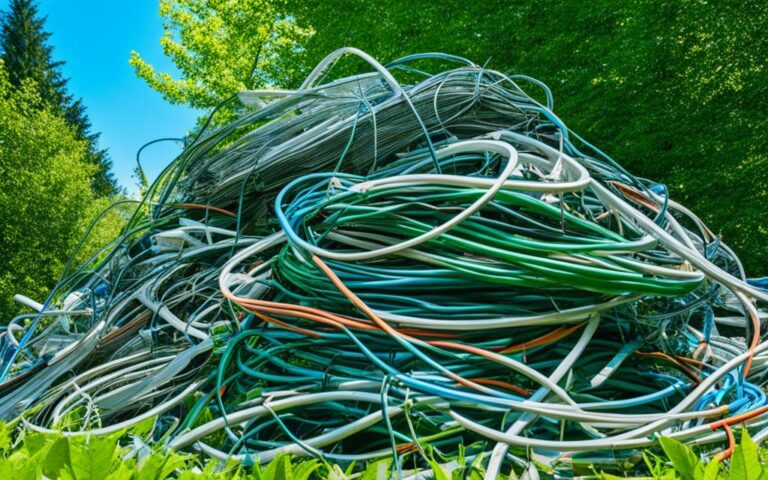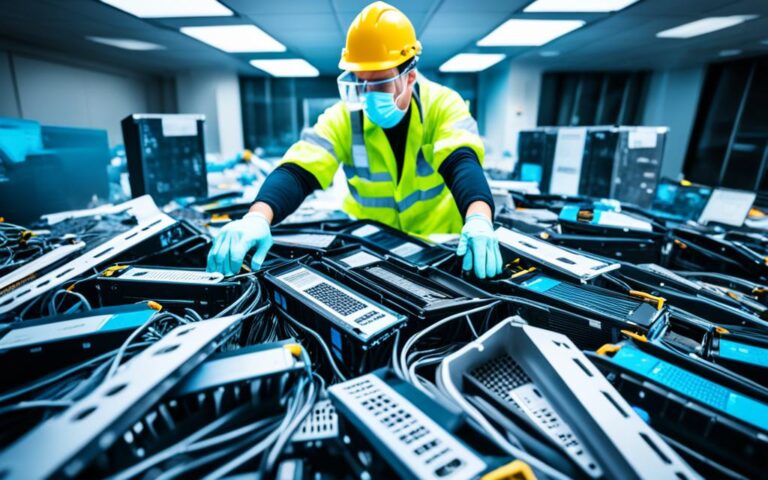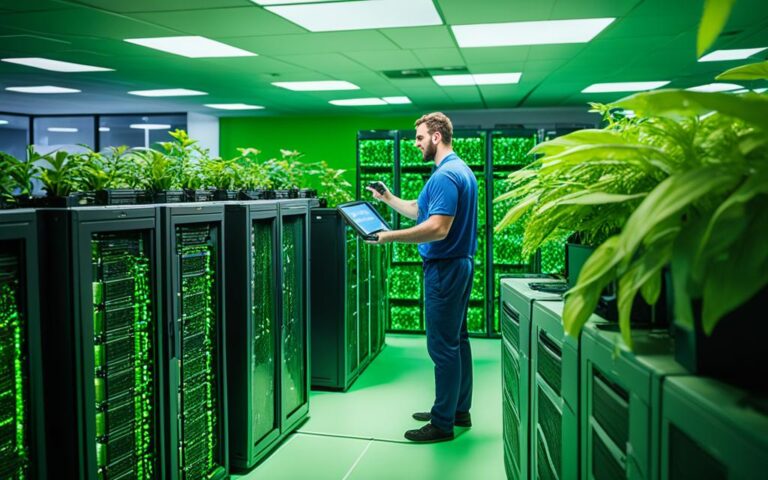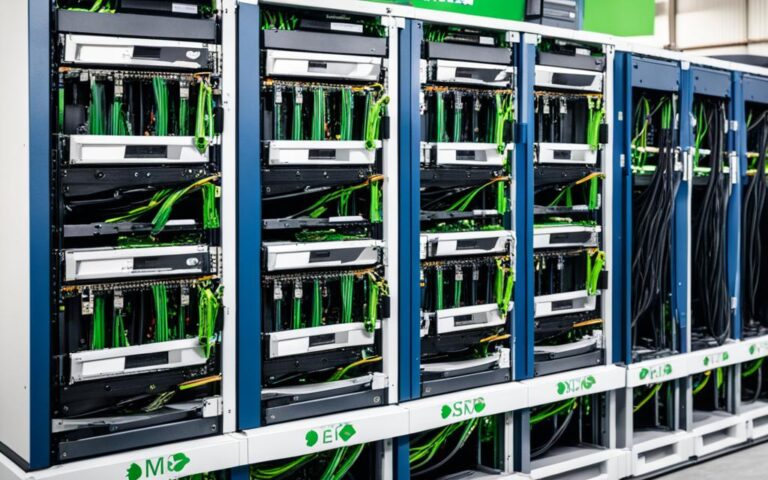The Impact of Server Recycling on Supply Chain Sustainability
Welcome to our article on the impact of server recycling on supply chain sustainability. As businesses strive to become more environmentally conscious, server recycling has emerged as a crucial practice for achieving sustainable supply chains. The process of recycling servers plays a significant role in reducing the carbon footprint of IT hardware, minimizing electronic waste, and conserving natural resources. By embracing sustainable server recycling practices, businesses can align their operations with environmental responsibility and contribute to a greener future.
Choosing a sustainable server provider is essential. By evaluating server providers based on energy management, emissions reduction, recycling and waste management, water conservation, and ecological supply chain administration, businesses can make informed decisions. Furthermore, the demand for sustainability in the IT sector is driven by green certifications and consumer preferences. So, by prioritizing server recycling and sustainability, businesses can enhance their brand image and attract eco-conscious customers.
Throughout this article, we will explore the advantages of sustainability in dedicated servers, the environmental impact of these servers, the sustainability challenges faced by the IT sector, and the methods and approaches for sustainability in server providers. We will also discuss the opportunities and challenges that server sustainability presents and conclude with the importance of responsible server recycling practices in achieving supply chain sustainability. Let’s dive in!
Understanding Environmental Sustainability
Environmental sustainability is vital for preserving Earth’s ecosystems for future generations. It involves managing resources and human activities to balance societal needs with the planet’s well-being.
Sustainability encompasses various practices that contribute to a greener future. These include:
- Waste management: Implementing strategies to reduce waste production, promoting recycling and responsible disposal methods.
- Renewable energy: Embracing clean energy sources like solar, wind, and hydropower to decrease reliance on fossil fuels.
- Water and land efficiency: Conserving water resources through efficient usage and reducing land degradation through sustainable land management.
- Sustainable farming and forestry: Adopting practices that balance agricultural and forestry activities with environmental preservation.
- Reducing greenhouse gas emissions: Taking measures to minimize carbon dioxide and other harmful greenhouse gas emissions.
To achieve true environmental sustainability, it is essential to understand that it is not a one-time action but a comprehensive plan. It requires a continuous effort to manage every stage of goods and services’ life cycles, from extraction to disposal or recycling.
Preserving nature is not merely an option; it is our responsibility. By making sustainable choices and acting towards environmental sustainability, we can ensure a healthier environment that supports both human life and economic growth.
Image: Environmental Sustainability
Advantages of Sustainability in Dedicated Servers
Incorporating sustainability practices in dedicated servers brings numerous benefits. By adopting sustainable server management, businesses can achieve lower energy consumption, resulting in reduced operating costs and decreased reliance on fossil fuels. This approach also plays a crucial role in minimizing the carbon footprint of data centers and supporting the transition to a low-carbon economy.
Sustainable techniques in managing dedicated servers can effectively reduce electronic waste through recycling, refurbishment, and the design of servers with extended lifespans. By prioritizing sustainability in their server operations, companies enhance their brand image and attract eco-conscious customers. Moreover, this commitment ensures compliance with environmental standards.
Sustainable server management also drives technological innovation and enhances long-term profitability and resilience. By preparing businesses for future sustainability requirements, it sets them on a path towards continuous growth and success.
“By adopting sustainable server management practices, businesses can reduce environmental impact, enhance brand image, and drive innovation for long-term profitability.”
To understand the advantages of sustainability in dedicated servers in more detail, let’s take a closer look at the key benefits:
1. Decreased Energy Use
Sustainable server management significantly decreases energy consumption, leading to lower costs and decreased reliance on fossil fuels. By implementing energy-efficient practices, businesses can optimize their operations and contribute to a more sustainable future.
2. Reduced Carbon Footprint
Minimizing the carbon footprint of data centers is a crucial step towards environmental sustainability. Sustainable server management helps achieve this goal by implementing energy-efficient measures, reducing greenhouse gas emissions, and supporting the global transition to a low-carbon economy.
3. Minimized Electronic Waste
By adopting sustainable practices, dedicated servers can contribute to the reduction of electronic waste. Recycling, refurbishment, and the design of servers with longer lifespans help minimize the negative environmental impact associated with electronic waste disposal.
4. Enhanced Brand Image
Prioritizing sustainability in server operations enhances a company’s brand image. Customers are increasingly drawn to businesses that demonstrate a commitment to environmental responsibility. By aligning their server management practices with sustainability, companies can attract eco-conscious customers and gain a competitive edge.
5. Compliance with Environmental Standards
Complying with environmental standards is essential for businesses operating in today’s sustainability-focused world. Incorporating sustainable practices in dedicated servers ensures that companies meet these standards and contribute to the overall goal of a greener, more sustainable IT sector.
6. Technological Innovation and Long-Term Profitability
Sustainable server management drives technological innovation. By prioritizing sustainability, businesses are pushed to explore innovative approaches and solutions to reduce their environmental impact. This commitment not only promotes long-term profitability but also prepares businesses for future sustainability requirements.
The Environmental Impact of Dedicated Servers
Dedicated servers have a significant environmental impact due to their high energy use and carbon dioxide footprint. These servers are essential for supporting digital infrastructure, but their energy consumption contributes to significant environmental challenges.
Data centers, which house dedicated servers, are among the world’s largest electricity consumers. The electricity needed to power these servers comes primarily from fossil fuel sources, leading to greenhouse gas emissions and contributing to climate change.
Furthermore, cooling needs in data centers require additional energy, often relying on traditional and energy-intensive methods such as air conditioning. The combination of continuous energy demand and cooling requirements exacerbates the environmental impact of dedicated servers, resulting in increased carbon emissions.
Advancements in renewable energy sources and innovative cooling technologies present opportunities to reduce the environmental impact of dedicated servers.
By transitioning to renewable energy sources like solar and wind power, data centers can significantly reduce their carbon footprint. Additionally, adopting more efficient cooling techniques, such as liquid cooling or free cooling, can minimize energy consumption and further decrease environmental impact.
Addressing the environmental impact of dedicated servers not only contributes to sustainability efforts in the IT sector but also aligns with global initiatives to combat climate change and achieve a more sustainable future.
Table: Environmental Impact of Dedicated Servers
| Environmental Impact | Actions to Reduce Impact |
|---|---|
| High energy use | – Transition to renewable energy sources – Implement energy-efficient practices – Optimize server performance |
| Carbon dioxide footprint | – Offset carbon emissions – Adopt innovative cooling technologies – Minimize energy consumption |
| Electronic waste | – Implement responsible recycling and disposal practices – Design servers for longevity and upgradability – Promote circular economy principles |
By taking proactive measures to reduce the environmental impact of dedicated servers, businesses can contribute to a more sustainable IT sector and protect the planet for future generations.
Sustainability Challenges in the IT Sector
The IT sector in the United Kingdom faces numerous sustainability challenges, encompassing excessive energy use, e-waste, resource depletion, supply chain sustainability, and digital infrastructure. These challenges require urgent attention to ensure a greener and more sustainable future.
The Energy Intensive Nature of Data Centers
Data centers, a critical component of the IT sector, consume enormous amounts of energy, contributing to high energy consumption and greenhouse gas emissions. The demand for digital services and the exponential growth of data-intensive technologies have intensified this energy usage.
The Issue of E-Waste
The rapid advancement of technology results in the disposal of outdated IT equipment, generating significant amounts of e-waste. If not managed properly, this electronic waste poses environmental risks, such as soil and water contamination and the release of toxic substances.
Resource Depletion and Habitat Loss
The extraction of raw materials required for the production of electronic devices contributes to resource depletion and habitat loss. The IT sector’s reliance on these finite resources threatens biodiversity and escalates ecological damage.
Ensuring Supply Chain Sustainability
For the IT sector to achieve true sustainability, it is crucial to ensure sustainability throughout the entire supply chain. This involves assessing the environmental impact of raw material extraction, manufacturing processes, logistics, and end-of-life disposal.
Preparing Digital Infrastructure for the Future
As the reliance on digital technology grows, the resilience of digital infrastructure becomes increasingly important. Developing sustainable practices and investing in resilient infrastructure will help mitigate risks and ensure continuous operability in the face of future sustainability requirements.
Addressing these sustainability challenges requires collaborative efforts from the IT sector, businesses, policymakers, and consumers. By embracing innovative solutions, implementing responsible practices, and promoting sustainability throughout the entire lifecycle of IT products and services, the sector can overcome these challenges and pave the way for a more sustainable and environmentally conscious future.
Sustainability Challenges in the IT Sector
| Challenge | Description |
|---|---|
| Excessive Energy Use | Data centers consume significant amounts of energy, contributing to high energy consumption and greenhouse gas emissions. |
| E-Waste Generation | The disposal of outdated IT equipment leads to the generation of e-waste, which poses environmental risks if not managed properly. |
| Resource Depletion | The extraction of raw materials for electronic devices contributes to resource depletion and habitat loss. |
| Supply Chain Sustainability | Ensuring sustainability throughout the supply chain is essential for reducing the environmental impact of the IT sector. |
| Digital Infrastructure Resilience | Preparing digital infrastructure for the future is crucial to mitigate risks and ensure continuous operability. |
Methods and Approaches for Sustainability in Server Providers
Evaluating the sustainability practices of server providers is crucial for businesses committed to supply chain sustainability. By assessing various aspects such as energy management, emissions reduction, recycling and waste management, water conservation, and ecological supply chain administration, businesses can make informed decisions and contribute to a greener future.
Energy management and efficiency play a significant role in sustainable server practices. Server providers can embrace energy-saving measures like utilizing energy-efficient power supplies, implementing dynamic cooling techniques, adopting server virtualization, and optimizing data centers. These practices not only reduce energy consumption but also minimize carbon emissions, contributing to a healthier environment and lower costs.
To further reduce carbon footprint, server providers can participate in carbon offset programs and source renewable energy. By investing in renewable energy sources, providers can demonstrate their commitment to sustainable practices and support the transition to a low-carbon economy. Improving server efficiency also contributes to emissions reduction, allowing businesses to align with environmental goals while boosting performance and efficiency.
Recycling and waste management are essential components of sustainability in server providers. Responsible disposal of electronic waste, refurbishment programs, and designing servers for longevity are crucial in minimizing the environmental impact of IT hardware. By partnering with server providers that prioritize recycling and waste management, businesses can contribute to the circular economy and reduce electronic waste.
Water conservation and usage is another area of focus for sustainable server management. Server providers can implement sustainable practices to minimize water consumption and promote responsible water usage within their operations. Adopting water-saving technologies, reducing water-intensive cooling systems, and constantly optimizing water usage contribute to water conservation efforts and promote sustainability.
Evaluating the ecological supply chain administration of server providers is vital for businesses aiming to support sustainability throughout the supply chain. This involves considering sustainability factors in supplier selection, promoting transparency, and ensuring ethical and environmentally responsible practices. By partnering with server providers that prioritize ecological supply chain administration, businesses can align their operations with sustainability goals and contribute to a greener future.
Overall, adopting sustainable methods and approaches in server providers offers numerous benefits. From reducing energy consumption and emissions to promoting responsible recycling and waste management, businesses can make a significant impact on the environment while aligning with sustainability goals. By evaluating server providers based on their commitment to sustainability, businesses can make informed decisions and actively contribute to a more sustainable IT sector.
Challenges and Opportunities in Server Sustainability
The IT sector faces both challenges and opportunities in the realm of server sustainability. These challenges include the excessive use of energy, the proper management of e-waste, resource depletion, and the resilience of digital infrastructure. However, within these challenges lie significant opportunities for innovation and improvement.
Server providers have the potential to leverage sustainability initiatives to drive innovation, improve performance, and address pressing environmental concerns. By embracing sustainable practices, server providers can meet the increasing demand for eco-friendly technology solutions and contribute to global sustainability goals.
Adopting sustainable approaches in server management not only helps to alleviate the sustainability challenges faced by the IT sector but also offers numerous opportunities for growth. By integrating energy-efficient technologies and optimizing server operations, providers can minimize their carbon footprint and reduce energy consumption. This not only contributes to environmental goals but also translates into cost savings for businesses.
“Embracing sustainability in server management presents an incredible opportunity for server providers to lead the way in the industry while minimizing their environmental impact.” – James Thompson, IT Sustainability Expert
Beyond the environmental benefits, embracing server sustainability practices can also enhance a provider’s reputation and attract environmentally conscious clients. With sustainability becoming a priority for many businesses and consumers, server providers that prioritize sustainability are well-positioned to gain a competitive edge in the market.
To fully realize the opportunities presented by server sustainability, providers need to proactively adopt sustainable practices throughout their operations. This includes implementing measures such as energy-efficient server designs, responsible e-waste management, and eco-friendly supply chain management. By demonstrating their commitment to sustainability, server providers can build trust with clients and contribute to a more sustainable IT ecosystem.
Innovative Solutions for Server Sustainability
Several innovative solutions have emerged to address the challenges and opportunities in server sustainability:
- Renewable Energy Integration: Server providers can source renewable energy to power their data centers, reducing reliance on fossil fuels and lowering carbon emissions.
- E-Waste Recycling Programs: Implementing responsible e-waste recycling programs ensures that outdated server equipment is recycled or repurposed, minimizing electronic waste.
- Efficient Cooling Technologies: Innovative cooling technologies, such as liquid cooling systems, can drastically reduce the energy consumption associated with data center cooling.
- Supply Chain Transparency: By prioritizing supply chain transparency, server providers can ensure that sustainability practices are enforced throughout the entire lifecycle of their products, from sourcing to disposal.
By embracing these innovative solutions and seizing the opportunities presented by server sustainability, providers can not only overcome the challenges but also drive positive change within the IT sector. Together, these efforts can contribute to a more sustainable and environmentally conscious future.
| Server Sustainability | Challenges | Opportunities |
|---|---|---|
| Excessive use of energy | The need to optimize energy consumption and reduce reliance on fossil fuels | Integration of renewable energy sources to power data centers, reducing energy costs and carbon emissions |
| Proper management of e-waste | Risk of environmental contamination and resource depletion | Implementation of responsible e-waste recycling programs, repurposing old equipment, and minimizing electronic waste |
| Resource depletion | Extraction of raw materials contributing to habitat loss and resource scarcity | Supply chain transparency and responsible sourcing practices to minimize resource depletion |
| Resilience of digital infrastructure | Vulnerability to disruptions and the need to adapt to changing sustainability requirements | Investment in robust and adaptable digital infrastructure to ensure long-term environmental and operational resilience |
Conclusion
Server recycling is a crucial step towards achieving supply chain sustainability and responsible resource management. By embracing sustainable server management practices, businesses can significantly reduce their environmental impact and contribute to a greener and more sustainable future. It is essential for companies to choose sustainable server providers that align with environmental responsibility and prioritize responsible practices.
When evaluating server providers, businesses should consider sustainability criteria such as energy management, emissions reduction, recycling and waste management, water conservation, and ecological supply chain administration. By making informed decisions and selecting providers committed to transparency, innovation, and future sustainability goals, businesses can actively participate in creating a more sustainable IT sector.
Not only does sustainable server management minimize the carbon footprint of IT hardware and reduce electronic waste, but it also enhances a company’s brand image and attracts environmentally conscious customers. By adopting responsible practices and aligning business operations with supply chain sustainability, businesses can contribute towards a greener future while driving technological innovation and ensuring long-term profitability.
FAQ
What is the impact of server recycling on supply chain sustainability?
Server recycling plays a crucial role in achieving supply chain sustainability. It helps minimize the carbon footprint of IT hardware, reduce electronic waste, and conserve natural resources.
What is environmental sustainability?
Environmental sustainability involves managing resources and human activities to balance societal needs with the planet’s well-being. It encompasses waste management, renewable energy, water and land efficiency, sustainable farming and forestry, and reducing greenhouse gas emissions.
What are the advantages of sustainability in dedicated servers?
Sustainable server management decreases energy use, reduces operating costs, and supports the transition to a low-carbon economy. It also minimizes electronic waste through recycling, refurbishment, and designing servers with a long lifespan.
What is the environmental impact of dedicated servers?
Dedicated servers have a significant environmental impact due to their energy usage and carbon footprint. They require a substantial amount of electricity for digital infrastructure, contribute to greenhouse gas emissions, and generate electronic waste.
What are the sustainability challenges in the IT sector?
The IT sector faces challenges such as excessive energy use, e-waste generation, resource depletion, supply chain sustainability, and the resilience of digital infrastructure.
How can server providers adopt sustainability practices?
Server providers can adopt sustainability practices by focusing on energy management, emissions reduction, recycling and waste management, water conservation, and ecological supply chain administration.
What are the challenges and opportunities in server sustainability?
The challenges in server sustainability include excessive energy use, proper e-waste management, resource depletion, and ensuring the resilience of digital infrastructure. However, these challenges also present opportunities for innovation and improvement.
Why is server recycling important for supply chain sustainability?
Server recycling is important for supply chain sustainability because it helps minimize environmental impact, reduce electronic waste, and contribute to a greener and more sustainable future.



